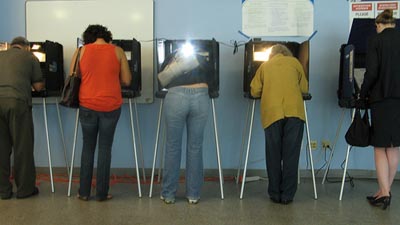On Election Day, voters across the U.S. approved 72 percent of transportation referenda.
Sen. Barack Obama was not the only
big winner on November 4. More than
43 million people in 16 states were asked to approve transit-related ballot
initiatives – including proposals for high speed rail, to expand transit
services, and increase multimodal accessibility to move people more quickly and
efficiently. AcrossAmerica, voters chose to increase
sales taxes, property taxes, or issue bonds for the next 20 to 30 years to
support, create, or expand various inter-city, suburb-to-suburb, countywide, and
regional transportation projects. Streetcars in West Sacramento, Calif., new bus
fleets in Aspen, Colo., street improvement projects in Lawrence, Kan., and a new
commuter rail system in Honolulu, Hawaii are just a few of the projects that
received voter approval on November 4th.

Election Day - Photo Courtesy of
Danny Arenas
In 2007, voters in Seattle, Wash., were asked to approve an all-inclusive
‘roads and transit’ construction plan.
They rejected the proposition, arguing it was too costly, would take too
long, and did not adequately address the specific needs of the city. Last week, voters approved a new and
improved $17.8 billion proposition that eliminated the initial plan’s road and
highway provisions, and instead focused squarely on transit enhancements. Funded by a sales tax increase, the
proposition will add 34 additional miles of light rail and an expanded bus
system in 15 years. Improvements
outlined in the proposal will reduce approximately 30 percent of Seattle’s congestion and
cost the average person $69 per year – about the same price as filling up one
tank of gas.
According to the U.S.
Dept. of Transportation, approximately 34,000 jobs are supported with every $1
billion invested by the federal government in transportation. Nationwide, voters
authorized approximately $75 billion in expenditures for transportation projects
– an investment that supports more than 2.6 million jobs. Furthermore, the American Public
Transportation Association (APTA) estimates that for every $1 taxpayers invest
in transportation, $6 are generated in economic returns. In a stumbling economy,
supporting high-quality, smart transportation infrastructure is a long-term
investment that will help build regional sustainability across the country.
In an era of fluctuating gas prices,
high costs of living, and financial strains on family budgets, Americans from
coast-to-coast expressed their desire for change by investing scarce resources
on long-term transportation projects.
These investments will create jobs for working Americans, savings at the
gas pump, and a cleaner, better environment.
This article was featured in Talking
Transit, MPC’s bi-weekly e-newsletter. To receive the newsletter, email talkingtransit@metroplanning.org
with ‘Subscribe’ in the subject line.